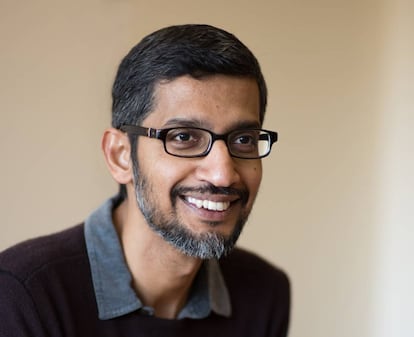Google¡¯s Sundar Pichai: ¡°We are worried about political meddling¡±
The CEO of the global tech company speaks to EL PA?S about the impact of digital disruption

Sundar Pichai took over as the CEO of Google two years ago. His first big responsibility was Chrome, a browser that is now the market leader. Then he moved on to Google Drive, Google Maps and Android.
This father of two who arrived in the US as an immigrant from India is now looking at how artificial intelligence and machine learning could improve people¡¯s lives with products such as Google Home.
From Google¡¯s headquarters in Mountain View, Pichai ¨C a vegetarian who dresses informally and whose unassuming manner differs vastly from that of the average exec ¨C spoke to EL PA?S about some of his key concerns, from the need to improve digital literacy to the risks of fake news and the challenges of creating a more diverse tech sector.
AI is both the biggest opportunity that we have as humanity and one of the biggest challenges we will face
Question. You recently announced a one billion dollar fund to help people scared of losing their jobs build new skills. How is that going to help?
Answer. We are focused on digital skilling. In the past, you educated yourself once and that lasted you a lifetime. I think what is changing for the world is that many, many people have to retrain themselves and adapt. We are trying to influence this change with grants to not-for-profits that are working in government and other programs. Digital skilling is one part of it. How do you come up with courses for people to come in for nine months to a year? It¡¯s not just $1 billion that we commit; we are trying to pull other people on this journey. I think machine learning and AI will play an important role here, making learning more personalized.
Q. Is society ready for artificial intelligence?
A. AI is both the biggest opportunity that we have as humanity and one of the biggest challenges we will face. Every time the industry has revolutionized things, we work to understand the benefits and challenges. AI has the potential to drive significant breakthroughs across many areas. I genuinely think it will have positive impacts on health care, climate, education. Obviously it will be disruptive as well which is why I think we all need to work together to intervene and help prepare people for this future. We shouldn¡¯t assume that AI won¡¯t happen. It has nothing to do with Google or any other company. Technology moves forward. What we need to do as a society is get ready for it, harness the benefits and minimize the downsides and approach it ethically and responsibly. I think there will be many new jobs created that didn¡¯t exist before. AI will help people live happier, more productive lives.
Q. Many people relate AI to repression and loss of privacy. How do you respond to these concerns?
A. I think these are important conversations. I share these concerns. But I think it is important to think about global approaches to these problems. The Paris climate agreement for instance was an important example of how we can come together, but only frameworks like that can work. You can¡¯t do things unilaterally. People expressing concerns are expressing valid concerns. But it is super important to understand that it is still very early. I can¡¯t stress that enough.
Women represent 50% of the world¡¯s population. You can¡¯t develop products for the world without their perspective
Q. If you were not the CEO of Google but the chief advisor to the German chancellor, what advice would you give?
A. I had the opportunity to participate in a summit there on education. I felt Germany had a good approach because the states were working on introducing digital literacy early on in the education system. Adapting the curriculum is the single biggest thing I would do. I see the German industry beginning to adopt AI I think that is what will keep it advancing.
Q. China has ambitious plans for AI.
A. I think it is great the China is investing in AI. When companies develop up they develop inter-dependencies. To me this is all a positive development. We provide Android today in China. We partner with Chinese companies as they expand outside of China.
Q. How do you build trust?
A. With scale comes scrutiny. There is a lot of choice for users. The way users use our products is by giving them satisfaction and gaining their trust. That¡¯s the yardstick by which we build our business.
Q. What is Google going to do to address Russian propaganda and ads?
A. As Google we work hard to provide high-quality information. Everything that happens on Google is for the world to see. If we get something wrong it is on the front page of newspapers. We take this extremely seriously so when it comes to political interference, we build a lot of safeguards. Anything that we got wrong was a mistake so I want to acknowledge that. But a lot of the things we did actually worked. But every time we realize there is a problem, we work hard to improve our products.
Q. Your platforms can be used to share terrorist messages. Does Google have the responsibility to address this?
A. Absolutely. As a society, concerns change, and we have to respond to that. How much encryption do users want, how much privacy, these are things that are constantly changing. We don¡¯t provide products just to users. We play a role in society and we try to find a balance.
We shouldn¡¯t assume that AI won¡¯t happen.? Technology moves forward. We need to get ready for it
Q. What are you doing to create a more diverse company?
A. Google was one of the first companies to publish numbers around our diversity and that was a way to get the conversation started.There have been many areas where we have been able to improve inclusion. But progress has been very slow. But we are investing in long-term efforts. Women represent 50 percent of the world's population. You can¡¯t develop products for the world without their perspective.
Q. How has Google changed since you joined?
A. The thing which is impressive is also what hasn¡¯t changed. Our core mission of organizing users¡¯ information has remained. Gmail in 2004 is no different from Google Photos 10 years later. We have never changed our approach to apply computer science to solve problems for billions of people. What has evolved is that we can work on more problems. We are always coming up with new platforms. For me, building Chrome or Android is no different to building Google Cloud. We are constantly building platforms where other people can do work and build new things.
Q. What role does science fiction have in innovation?
A. Growing up I didn¡¯t have access to technology. We waited five years to get a phone. Before the phone, I would have to wait at the hospital to get my mother¡¯s blood results and they would tell me they weren¡¯t ready yet and I had to go back and spend another four hours waiting. We waited four years to get a refrigerator. I have seen the change discreetly and I have seen how it can impact people positively. I think it is sad that people at a young age die of cancer and I think technology will have a role in solving that. Language is a barrier but us being able to use technology to break down those barriers will have a hugely positive effect.
English version by Melissa Kitson.
Tu suscripci¨®n se est¨¢ usando en otro dispositivo
?Quieres a?adir otro usuario a tu suscripci¨®n?
Si contin¨²as leyendo en este dispositivo, no se podr¨¢ leer en el otro.
FlechaTu suscripci¨®n se est¨¢ usando en otro dispositivo y solo puedes acceder a EL PA?S desde un dispositivo a la vez.
Si quieres compartir tu cuenta, cambia tu suscripci¨®n a la modalidad Premium, as¨ª podr¨¢s a?adir otro usuario. Cada uno acceder¨¢ con su propia cuenta de email, lo que os permitir¨¢ personalizar vuestra experiencia en EL PA?S.
En el caso de no saber qui¨¦n est¨¢ usando tu cuenta, te recomendamos cambiar tu contrase?a aqu¨ª.
Si decides continuar compartiendo tu cuenta, este mensaje se mostrar¨¢ en tu dispositivo y en el de la otra persona que est¨¢ usando tu cuenta de forma indefinida, afectando a tu experiencia de lectura. Puedes consultar aqu¨ª los t¨¦rminos y condiciones de la suscripci¨®n digital.










































